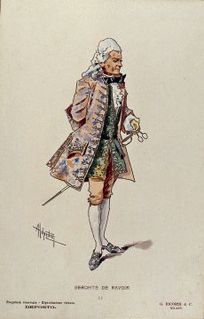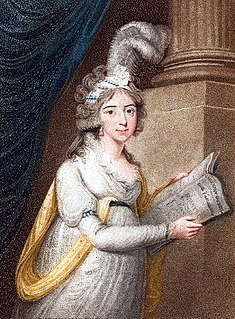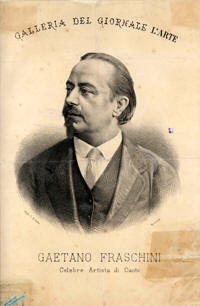Related Research Articles

Luis Ernesto Alva y Talledo, better known as Luigi Alva is a Peruvian operatic tenor. A Mozart and Rossini specialist, Alva achieved fame with roles such as Don Ottavio, Count Almaviva and Fenton. He retired from the stage in 1989.
Dano Raffanti is an Italian tenor, particularly associated with the Italian baroque and bel canto repertory.

Cristoforo Colombo is an opera in four acts and an epilogue by Alberto Franchetti to an Italian libretto by Luigi Illica. It was written in 1892 to commemorate the 400th anniversary of Christopher Columbus' arrival in America.

Alessandro Polonini was an Italian bass-baritone. He created the roles of Benoît and Alcindoro in Puccini's opera La bohème, as well as Geronte de Ravoir in his Manon Lescaut. Polonini also created the role of the surgeon in Verdi's La forza del destino.

BrigidaGiorgi, better known by her husband's surname and her stage-name, as Brigida Banti (1757–1806) was an Italian soprano.
Domenico Reina was a Swiss bel canto tenor, notable for creating roles in the operas of Vincenzo Bellini, Gaetano Donizetti, Saverio Mercadante, and other Italian composers.
Dezső Ernster was a Hungarian opera singer who sang leading bass roles with the New York Metropolitan Opera from 1946 to 1963. In 1929, he created the role of Baron d'Houdoux in Hindemith's Neues vom Tage.

Gaetano Fraschini was an Italian tenor. He created many roles in 19th century operas, including five composed by Giuseppe Verdi. His voice was "heroic ... with a baritonal quality, ... yet Verdi and Donizetti appreciated his ability to sing softly and with subtlety." An Italian biographer has pointed out Fraschini's role in extending the longevity of Donizetti's operas, while at the same time accelerating the ascent of Verdi's repertory. He was indeed the most prominent singer who facilitated the transition from Donizetti to Verdi. Fraschini sang over one hundred roles and Verdi placed him at the top of his favorite tenors' list and described him as a "natural Manrico" for his Il trovatore. Fraschini also played a pivotal role in the success of many operas by Pacini and Mercadante.

Giacomo Vaghi was an Italian opera singer who had an active international career from 1925-1956. Along with Tancredi Pasero and Ezio Pinza, he was one of the leading operatic basses of his generation. He possessed a rich voice with a dark timbre that drew him particular acclaim in the operas of Giuseppe Verdi. He appears on several complete opera recordings made with EMI Classics and Cetra Records.

Constance Jawureck (1803–1858) was a French mezzo-soprano opera singer.
Jean Dun, also known as Jean Dun "père", was a French opera singer active at the Paris Opéra where he created many bass roles during the late 17th and early 18th centuries. He was also the bass soloist at the church of Saint-Paul-Saint-Louis in Paris during the time Charpentier was the Master of Music there. His voice is described in contemporary sources as basse-taille, which is closer in quality to that of a modern baritone.

Charles Rousselière was French operatic tenor who performed primarily at the Paris Opera, the Opéra de Monte-Carlo, and the Opéra-Comique. He sang in the world premieres of several operas, including the title role in Charpentier's Julien and Giorgio in Mascagni's Amica.

Giovanni Guicciardi was an Italian opera singer who sang leading baritone roles in the opera houses of Italy and Portugal. He is most remembered today for having created the role of Count di Luna in Verdi's Il trovatore. He created also several other leading roles in operas by lesser known Italian composers. Guicciardi accumulated a considerable fortune during the course of his career. After his retirement from the stage, he taught without payment in music schools in his native city, Reggio Emilia, and presided over a charity for orphaned musicians. He died in San Polo d'Enza at the age of 64.
Paolo (Pablo) Rosich was a Spanish-born opera singer and librettist widely known by the Italianized version of his first name. A skilled comic actor, he performed leading basso buffo roles in many Italian opera houses as well as in Lisbon, London, Madrid and New York. Rosich created the roles of Taddeo in Gioachino Rossini's L'italiana in Algeri and Buralicchio in Rossini's L'equivoco stravagante and also wrote the librettos for two operas by Manuel García: L'amante astuto and La figlia dell' aria.

La bella dormente nel bosco is an opera in three acts by Ottorino Respighi to a libretto by Gian Bistolfi based on Charles Perrault's fairy tale "Sleeping Beauty".
Calisto Bassi was an Italian opera librettist.

Paul Peter Christer Lindroos was a Finnish opera singer who appeared in leading tenor roles throughout Europe but was particularly associated with the Finnish National Opera and the Royal Danish Opera. Although he specialised in the 19th-century Italian spinto repertoire, he also sang in many 20th-century works and created the role of The King in Erik Bergman's Det sjungande trädet in 1995. In his later years he was a professor of voice at the Sibelius Academy in Helsinki and the Malmö Academy of Music in Sweden. He died along with his young son in a car accident near Malmö at the age of 59. He is buried in Pohja, Finland, the town of his birth.

Maria Carbone was an Italian operatic soprano. She created the lead female roles in two of Gian Francesco Malipiero's operas: the title role in Ecuba and Cleopatra in Antonio e Cleopatra.
Ugo Benelli is an Italian operatic tenor. Born in Genoa and trained at La Scala, Benelli had an international career singing leading tenore di grazia roles from the early 1960s through the 1980s. In his later years he sang character roles and began a career as a singing teacher. He retired from the stage in 2004.
Herbert Handt is an American operatic tenor and later conductor, particularly known for his conducting and editions of rarely performed Italian scores. Handt was born in Philadelphia and studied at the Juilliard School of Music and the Vienna Academy of Music. He made his debut as a singer at the Vienna State Opera in 1949 and his debut as a conductor in Rome in 1960.
References
- 1 2 Blyth, Alan (2008). "Scandiuzzi, Roberto". pp. 427–428. The Grove Book of Opera Singers. Oxford University Press. ISBN 0195337654
- ↑ Casaglia, Gherardo (2005). "La figlia del mago, 31 July 1981" . L'Almanacco di Gherardo Casaglia (in Italian).
- ↑ Rousseau, Jérémie (2012). "Scandiuzzi, Roberto", p. 1366. L'univers de l'opéra. Robert Laffont. ISBN 2221134044 (in French)
- ↑ Franco, Enrique (23 August 2004). "Una nueva estrella lírica". El País . Retrieved 5 March 2016 (in Spanish).